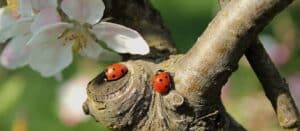18 Reasons Why You Should Plant a Tree Today!
Are there really any benefits of trees in urban and suburban areas? What’s the importance of trees in our lives? And why should we be encouraged to plant a tree in our yard?
It’s hard to imagine a world without trees. Their magnificent beauty has captured our imagination and brought us comfort throughout the ages. When we think of trees we often picture study oaks, wintery pines, and the rainbow of colors we see in the leaves that trees shed during the autumn months.
But many towns have paved over much of the green space, surrounded trees with sidewalks and parking lots, and topped all the trees along the utility’s right of way.
Given this, it’s sometimes easy to forget many of the benefits that trees bring to our lives.
When we think of the benefits trees give us, we may remember the shade they provide, the sustenance we gain from their nuts and their sap, and the wood we use to build our shelters from nature’s harsher elements.
The gifts of trees, however, extend beyond what readily comes to mind, especially when we’re talking about how we benefit from the trees that surround our homes.
Here are 18 of the top benefits that trees provide in our landscape.
Environmental Benefits of Trees
These are the benefits most of us think about when we think of trees. But it’s just the beginning of what trees do!
1. Clean Air. We all know that trees provide the oxygen we breathe. But did you know that they also filter out harmful dust and pollutants such as ozone, carbon monoxide and sulfur dioxide in the air? In fact, researchers have found that urban trees and forests save an average of one life every year per city because of the particulates that they remove from the air.
2. Clean Water. Forests provide natural filtration and storage systems that process nearly two-thirds of the water supply in the United States. The forests do such a good job that the local municipality usually only needs to do a minimum of additional filtering.
3. Carbon Sequestration. Trees slow down the build-up of heat-trapping carbon dioxide in our atmosphere caused by burning fossil fuels. A tree can absorb as much as 48 pounds of carbon dioxide per year, and can sequester one ton of carbon dioxide within 40 years.
4. Flood Control. Trees reduce the amount of storm water runoff, reducing erosion, cutting down pollution in our waterways and helping to control flooding.
5. Wildlife Habitat. Many species of wildlife, including birds, mammals, insects and reptiles, use trees for food, shelter, nesting, and mating.
Benefits of Trees in Urban Areas
As our towns and cities continue to cut down trees and lose more to disease and poor maintenance, it’s critical that we understand what we’re losing.
6. Increased Property Values. People prefer to live and work in areas with trees. That’s clearly seen in the fact that property values are 7 percent to 25 percent higher for houses surrounded by trees. Be careful though – topping your trees will actually lower the property value.
7. Reduced Urban Heat Island Effect. Through evaporative cooling and reducing the amount of sunlight that reaches parking lots and buildings, trees bring down the temperature in areas with large impervious surfaces, such as parking lots and industrial complexes.
8. Privacy and Less Noise. Surrounding your house, trees can give much needed privacy from neighbors and nearby roads, and cut noise pollution as much as 40%.
9. Safer Roads. Drivers tend to drive more slowly on tree-lined street, leading to fewer accidents.
Economic Benefits of Trees
If you’re looking for a reason to plant trees that hits close to home, here it is – you’ll save money on heating and cooling!
10. Lower Cooling Costs in Summer. Well-placed trees can reduce your cooling costs in the summer by shading the south and west sides of your home. In fact, households that plant shade trees in the right locations could spend 12% less on cooling costs in the summer. As an added bonus, less air conditioning means less Freon released into the environment (it’s shown to damage the ozone layer).
11. Lower Heating Costs in Winter. A combination of evergreen trees on the north side of your home and shrubs around the foundation of your home to act as a windbreak, and deciduous trees that allow the sun to warm your house in winter will reduce your monthly winter heating costs.
Health Benefits of Trees
Don’t underestimate the psychological and physiological impact of trees.
12. Lower Stress Levels. Laboratories have shown reduction in stress, as well as lower heart rates, within five minutes just by simple visual exposure to a tree filled setting.
13. Improved Mental Health. Several studies have found that access to nature yields better cognitive functioning, more self-discipline, and greater mental health overall.
14. Faster Recovery. Another study showed that hospital patients who can see trees out their windows recover more quickly from surgery and are hospitalized 8% fewer days than those without a view of trees.
15. Better Learning. Children remember more of the information taught in schools if they spend some of their time outdoors in green spaces.
Social Benefits of Trees
When trees are a part of our local community, they bring a host of benefits that help us all.
16. Reduced Crime. Neighborhoods with abundant trees have significantly fewer crimes than those without. And some studies even link specific types of trees to lower crime rates.
17. Stronger Sense of Community. Because green spaces have a calming effect, researchers believe that it encourages people to spend more time with their neighbors outdoors, bolstering community trust.
18. Increased Local Spending. In urban areas where trees are present, shoppers tend to linger longer and spend up to 13% more in local stores.
So the next time you’re looking for a small gardening or landscape project for your home, consider planting a tree. You’ll be glad you did!
GET THE LATEST NEWS
Subscribe to the Organic Plant Care Newsletter and get timely and helpful tips and updates monthly.
There's no spam - we promise!





